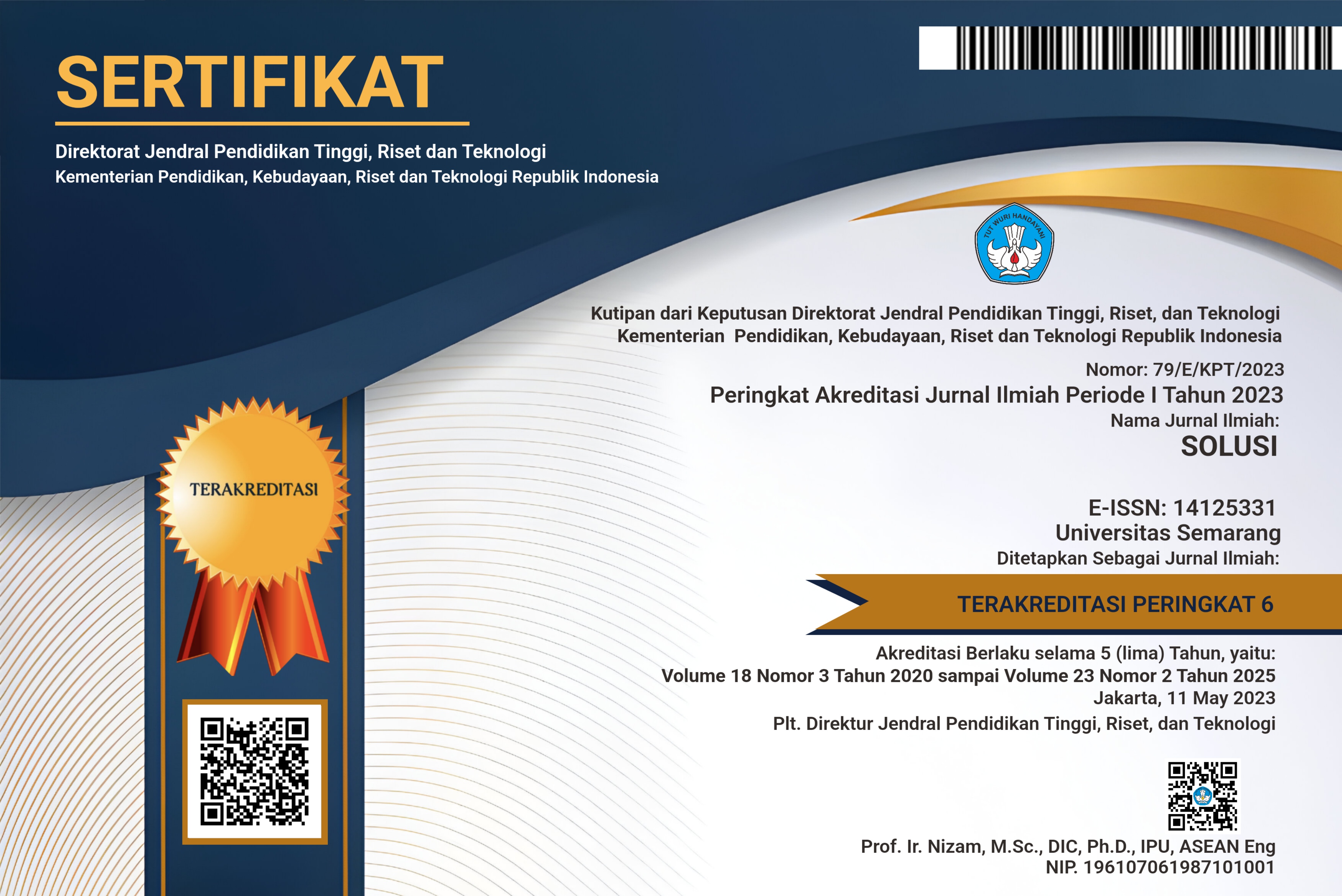Analisis Implikasi Capital Scructure, Operating Efficient dan Non-interest Income Terhadap Profitabilitas Bank
Abstract
Keywords
Full Text:
PDFReferences
Abdelaziz, H., Rim, B., & Helmi, H. (2022). The Interactional Relationships Between Credit Risk, Liquidity Risk and Bank Profitability in MENA Region. Global Business Review, 23(3), 561–583. https://doi.org/10.1177/0972150919879304
Abugamea, G. (2018). Determinants of Banking Sector Profitability: Empirical Evidence from Palestine.
Ahamed, Dr. F. (2023). Islamic Banks’ Halal Profitability Analysis: Evidence from Oman. Academic Platform Journal of Halal Life Style. https://doi.org/10.53569/apjhls.1307388
Ahmed, S., Majeed, M. E., Thalassinos, E., & Thalassinos, Y. (2021). The Impact of Bank Specific and Macro-Economic Factors on Non-Performing Loans in the Banking Sector: Evidence from an Emerging Economy. Journal of Risk and Financial Management, 14(5), 217. https://doi.org/10.3390/jrfm14050217
Alfadhli, M., & AlAli, M. (2021). The Effect of Bank Size on Financial Performance: A Case Study on Kuwaiti Banks. 4, 11–15.
Ali, M., & Puah, C. H. (2019). The internal determinants of bank profitability and stability. Management Research Review, 42(1), 49–67. https://doi.org/10.1108/MRR-04-2017-0103
Alyani, R., Sumantri, F., Gusmella, S., Ainur Rahmah, S., & Setyowati, S. (2022). Pengaruh equity to total asset ratio (EAR), inflasi dan suku bunga terhadap harga saham. In Online) KINERJA: Jurnal Ekonomi dan Manajemen (Vol. 19, Issue 3).
Anjom, W. (2021). An Empirical Study on the Factors Affecting the Interest Rate Spread of Listed Conventional Commercial Banks of Bangladesh. European Journal of Business and Management Research, 6(5), 192–199. https://doi.org/10.24018/ejbmr.2021.6.5.1086
Aprianti, T. L., & Rokhim, R. (2023). The Effect of Funding Source on Profitability of BPR (pp. 528–538). https://doi.org/10.2991/978-94-6463-226-2_42
Ayayi, A. G., & Sene, M. (2010). What drives microfinance institution’s financial sustainability. Journal of Developing Areas, 44(1), 303–324. https://ideas.repec.org/a/jda/journl/vol.44year2011issue1pp303-324.html
Ayoush, M. D., Toumeh, A. A., & Shabaneh, K. I. (2021). Liquidity, leverage, and solvency: what affects profitability of industrial enterprises the most? Investment Management and Financial Innovations, 18(3), 249–259. https://doi.org/10.21511/IMFI.18(3).2021.22
Azhar, K., & Ahmad, N. (2019). Relationship Between Firm Size and Profitability: Investigation from Textile Sector of Pakistan. 11, 63–73.
Batten, J., & Vo, X. V. (2019). Determinants of Bank Profitability—Evidence from Vietnam. Emerging Markets Finance and Trade, 55(6), 1417–1428. https://doi.org/10.1080/1540496X.2018.1524326
Bintara, R. (2020). The Effect of Working Capital, Liquidity and Leverage on Profitability. Saudi Journal of Economics and Finance, 04(01), 28–35. https://doi.org/10.36348/sjef.2020.v04i01.005
Eckbo, B. E., & Kisser, M. (2021). The Leverage–Profitability Puzzle Resurrected. Review of Finance, 25(4), 1089–1128. https://doi.org/10.1093/rof/rfaa032
Eviyanti, Y. N., Suhartono, & Kristijadi, E. (2018). The Effect Of Credit Risk On Bank Profitability With Efficiency As The Intervening Variable. Russian Journal of Agricultural and Socio-Economic Sciences, 74(2), 179–186. https://doi.org/10.18551/rjoas.2018-02.20
Farkasdi, S., Septiawan, B., & Alghifari, E. S. (2021). Determinants Of Commercial Banks Profitability: Evidence From Germany. Jurnal Riset Akuntansi Kontemporer, 13(2), 82–88. https://doi.org/10.23969/jrak.v13i2.4500
Farooq, M. O., Miah, M. D., Kabir, M. N., & Hassan, M. K. (2023). The impact of banks’ capital buffer on equity return: evidence from Islamic and conventional banks of GCC countries. Journal of Islamic Accounting and Business Research. https://doi.org/10.1108/JIABR-08-2022-0218
Gazi, M. A. I., Alam, M. S., Hossain, G. M. A., Islam, S. M. N., Rahman, M. K., Nahiduzzaman, M., & Hossain, A. I. (2021). Determinants of profitability in banking sector: Empirical evidence from bangladesh. Universal Journal of Accounting and Finance, 9(6), 1377–1386. https://doi.org/10.13189/ujaf.2021.090616
Hidayat, I., & Dewi, F. O. S. (2022). Effect of Liquidity, Leverage, and Working Capital Turn on Profitability. APTISI Transactions on Management (ATM), 7(1), 60–68. https://doi.org/10.33050/atm.v7i1.1832
Hossain, M. S., & Ahamed, F. (2021). Comprehensive Analysis On Determinants Of Bank Profitability In Bangladesh.
Jigeer, S., & Koroleva, E. (2023). The Determinants of Profitability in the City Commercial Banks: Case of China. Risks, 11(3), 53. https://doi.org/10.3390/risks11030053
Karim, A., Widyarti, E. T., & Santoso, A. (2022). Effect of current ratio, total asset turnover, and size on profitability: Evidence from Indonesia manufacturing companies.
Lestari, S. N. (2015). Business Judgment Rule Sebagai Immunity Doctrine Bagi Direksi Badan Usaha Milik Negara Di Indonesia. Notarius, 8(2), 302–314. https://doi.org/10.14710/NTS.V8I2.10261
Linawati, N., Moeljadi, Djumahir, & Aisjah, S. (2023). The Effect of Liquidity, Efficiency, and Overhead on Bank Profitability (pp. 42–51). https://doi.org/10.2991/978-94-6463-178-4_6
Mehzabin, S., Shahriar, A., Hoque, M. N., Wanke, P., & Azad, Md. A. K. (2023). The effect of capital structure, operating efficiency and non-interest income on bank profitability: new evidence from Asia. Asian Journal of Economics and Banking, 7(1), 25–44. https://doi.org/10.1108/ajeb-03-2022-0036
Meslier, C., Tacneng, R., & Tarazi, A. (2014). Is bank income diversification beneficial? Evidence from an emerging economy. Journal of International Financial Markets, Institutions and Money, 31(1), 97–126. https://doi.org/10.1016/j.intfin.2014.03.007
Modigliani, F., & Miller, M. (1958). The Cost of Capital, Corporation Finance and The Theory of Investment. The American Economic Review, 48(3).
Nawangsari, A. T., Junjunan, M. I., Fakhiroh, Z., Yudha, A. T. R. C., & Fitrianto, A. R. (2022). Performance Index And Operating Ratio: Effects Islamic On Sharia Profitability In Indonesia. Jurnal Riset Akuntansi Kontemporer, 14(2), 175–188. https://journal.unpas.ac.id/index.php/jrak/index
Nguyen, D., & Nguyen, T. (2021). Analysis Of Internal Factors Affecting Bank Probability: Evidence From Listed Banks On Vietnam Stock Market. IJIIS: International Journal of Informatics and Information Systems, 4(2), 138–148. https://doi.org/10.47738/ijiis.v4i2.111
Nisar, S., Peng, K., Wang, S., & Ashraf, B. (2018). The Impact of Revenue Diversification on Bank Profitability and Stability: Empirical Evidence from South Asian Countries. International Journal of Financial Studies, 6(2), 40. https://doi.org/10.3390/ijfs6020040
Parvin, S. S., Hossain, B., Mohiuddin, M., & Cao, Q. (2020). Capital Structure, Financial Performance, and Sustainability of Micro-Finance Institutions (MFIs) in Bangladesh. Sustainability, 12(15), 6222. https://doi.org/10.3390/su12156222
Puspitasari, E., Sudiyatno, B., Hartoto, W. E., & Widati, L. W. (2021). Net Interest Margin and Return on Assets: A Case Study in Indonesia. Journal of Asian Finance, Economics and Business, 8(4), 727–734. https://doi.org/10.13106/JAFEB.2021.VOL8.NO4.0727
Regehr, K., & Sengupta, R. (2016). Has the Relationship between Bank Size and Profitability Changed? Economic Review, Q II, 49–72. https://ideas.repec.org/a/fip/fedker/00040.html
Ruslan, A., Pahlevi, C., Alam, S., & Nohong, M. (2019). The Role Of Efficiency Mediation In The Effect Of Banks Size On Bank Profitability In Indonesia. Hasanuddin Economics and Business Review, 3(1), 49–58. https://doi.org/10.26487/HEBR.V3I1.1846
Sahyouni, A., & Wang, M. (2019). Liquidity creation and bank performance: evidence from MENA. ISRA International Journal of Islamic Finance, 11(1), 27–45. https://doi.org/10.1108/IJIF-01-2018-0009
Sitompul, S., & Nasution, S. K. (2019). The Effect of Car, BOPO, NPF, and FDR on Profitability of Sharia Commercial Banks in Indonesia. Budapest International Research and Critics Institute (BIRCI-Journal) : Humanities and Social Sciences, 2(3), 234–238. https://doi.org/10.33258/birci.v2i3.412
Susilawati, S., & Nurulrahmatiah, N. (2021). Pengaruh Non-Performing Loan (NPL) dan Loan to Deposit Ratio (LDR) terhadap Return on Asset (ROA) dengan Net Interest Margin (NIM) sebagai Variabel Mediasi pada Bank BUMN yang Terdaftar di BEI. Jurnal Maksipreneur: Manajemen, Koperasi, Dan Entrepreneurship, 11(1), 69. https://doi.org/10.30588/jmp.v11i1.833
Tan, Y., Floros, C., & Anchor, J. (2017). The proftability of Chinese banks: Impacts of risk, competition and efficiency. Review of Accounting and Finance, 16(1), 86–105. https://doi.org/10.1108/RAF-05-2015-0072/FULL/PDF
Trang, L. N. T., Nhan, D. T. T., Phuong, D. N. T., & Wong, W.-K. (2022). The Effects Of Selected Financial Ratios On Profitability: An Empirical Analysis Of Real Estate Firms In Vietnam. Annals of Financial Economics, 17(01). https://doi.org/10.1142/S2010495222500063
Uddin, Md. K. (2022). Effect of Leverage, Operating Efficiency, Non-Performing Loan, and Capital Adequacy Ratio on Profitability of Commercial Banks in Bangladesh. European Journal of Business and Management Research, 7(3), 289–295. https://doi.org/10.24018/ejbmr.2022.7.3.1463
Zaman, M. B. (2021). Influence of Debt To Total Asset Ratio (DAR) Current Ratio (CR) and Total Asset Turnover (TATO) on Return On Asset (ROA) and Its Impact on Stock Prices on Mining Companies on the Indonesia Stock Exchange in 2008-2017. Journal of Industrial Engineering & Management Research, 2(1), 114–132.
DOI: http://dx.doi.org/10.26623/slsi.v23i1.9600
Refbacks
- There are currently no refbacks.
Copyright (c) 2025 Michael Jordy, Susy Muchtar

This work is licensed under a Creative Commons Attribution 4.0 International License.
SOLUSI Published by : Fakultas Ekonomi , Universitas Semarang Soekarno Hatta Street, Tlogosari Kulon, Pedurungan Semarang City, Central Java - Indonesia P-ISSN : 1412-5331 E-ISSN : 2716-2532 Email : solusi@usm.ac.id |  |












